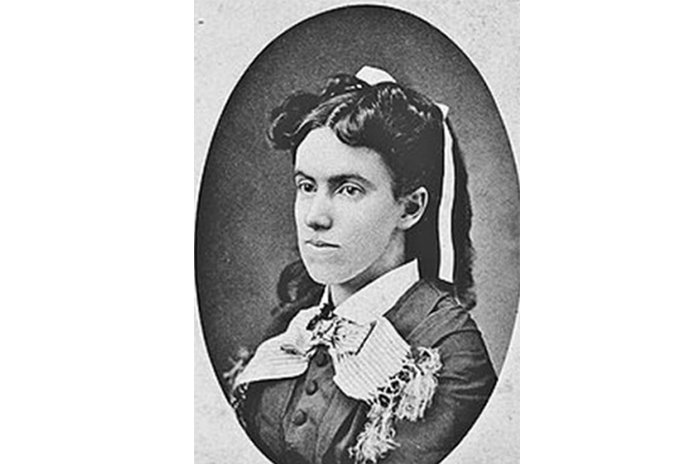In the modern times, especially from 1840 to 1912 (the last era of the Qing Dynasty of China), female missionaries to the country outnumbered male missionaries. The female missionaries who came to Dengzhou in the second half of the 19th century actively engaged in the work of ministering to women and children, setting up schools, preaching to women, organizing women to participate in various activities that men participated in. This not only opened up the path of Chinese women to enter society and prepared conditions for the gradual rise of the Chinese women's movement, but also in turn had an important impact on the United States in the second half of the 19th century. It became "an amazing and meaningful part of the history of American society", and contributed to "the first time in America in which women more or less achieved equal status with men".
Lottie Moon, among the many female missionaries to Dengzhou in modern times, is honoured as their outstanding representative.
Lottie Moon was born in 1840 to a prominent family in Virginia. Her family was well off, having eight large farming estates and more than 800 slaves. When she was a young woman, she studied abroad and was well-educated, being the first woman in the American south to receive a Master of Arts degree. Witnessing the Civil War in the United States as well as the great changes in the post-war living environment and social upheavals, she founded a school and worked as a teacher, searching for the true meaning of life. Eventually she decided to go to China as a missionary, and in 1873 she came to Dengzhou. She preached and taught there for forty years and died in 1912.
Lottie Moon died in unusual circumstances.
The war between Japan and Russia in 1894-1895 seriously affected Shandong's economy and people's life. During and after the war, labor exports and merchandise trade were once disrupted, resulting in "50% increase in the cost of living in Shandong between 1905 and 1909" while "the plague and smallpox swept through most of the province, and people starved all the year round". In addition to that, "the chaos brought about by the 1911-1912 Revolution made matters worse". Famine spread through the disaster stricken areas that were said to have had a "very strange colour in the sky with dead bodies on the streets and rural mothers hanging themselves." Lottie Moon made a "final appeal" to the United States, which repeatedly calling and pleading "for God and humanitarianism". However, at that time the Southern Baptist headquarters in the United States was in financial difficulties and unable to help. Lottie Moon herself tried all she could to aid Dengzhou. After trying with the best of her ability but hardly solving any problems, she became distraught.
It is said that "from about mid-1912, Miss Moon began to fall into a state of depression that was called irrepressible sadness or extreme depression." In August, she withdrew a small amount of money from a bank in Shanghai and donated it as disaster relief funds. In the last item of her diary, she wrote: 'I pray that no missionary should be as lonely as I am.' Not only did she suffer from tragic depression, but she also suffered from a skull abscess and began to have hallucinations like Mrs. Mateer. "
In December, a Baptist doctor found that she had decided not to eat and had not actually eaten for some time. She had decided this out of sympathy for the suffering Christians in Pingdu because she believed they must have been starving. Her colleagues decided to send her back to America. Miss Moon was put on board a ship that set sail on December 20th. She died four days later. According to Miss Miller, she appeared to be talking to 'Chinese friends who had passed away' when she was dying.
"Lottie Moon died at the port of Kobe, Japan, and under Japanese law her body was cremated and her ashes were transported to a Baptist cemetery in Crewe, Virginia, where she was buried with her brother Isaac."
Lottie Moon kept her pain to herself leaving "the fragrance in the memory of many locals and expatriates".
In fact, in the late 19th century, several female missionaries came to Dengzhou, including Mrs. Holmes, Mrs. Nevius, Mrs. Crawford, Mrs. Mateer, Mrs. Mills I and Mrs. Mills II, who all did important work for the cause of women and cultural exchange. They should be considered pioneers of the feminist movement and role models for intercultural exchange in that particular historical context. Other female missionaries, two of three of Shandong's most famous female missionaries--Mrs. Crawford and Mrs. Mateer--even they were considered by the American scholar Hyatt Jr. to not have the same reputation as Miss Moon. Lottie Moon's "name represents not only millions of Southern Baptists in the United States, but also China." She "became a recognized saint" "in a church that doubted there were saints" and "showed love beyond the nation in a place that was supposed to be rife with ethnic hatred." In fact, she had become a true cultural heroine, and in a way had surpassed all the missionaries who came to China, even more than any American who came to China."
Why did Lottie Moon receive such high recognition?
Taking the three most famous female missionaries in Shandong as an example, one could argue that Mrs. Crawford, although widely praised by Chinese and foreign people at the time, may not have received the honour she deserved after her death perhaps because of the later separation from the Baptist Church. Mrs. Mateer was also loved by Chinese and foreign people who knew her well, but her reputation was drowned out by her husband's overly large reputation at the time and after, although Mr. Mateer repeatedly claimed that his success was impossible without the efforts of his wife. The fact that Lottie Moon enjoys the "heroine" title and prominent reputation is perhaps due to the fact that here was a single woman's success compared to Crawford's failed leadership at the Dengzhou Baptist Church. And perhaps there is the compassion and admiration from the public to such people who do not marry in life but rather are dedicated to the cause of missionary work, suffering from long-term loneliness in a foreign country. Although these may make sense, yet they are not the main reason. The main reason is probably because she was the "pioneer of feminism" in the eyes of Americans and a model of international cultural exchange.
Today's people understand that there were so many women coming to China at that time, and perhaps acknowledge that American men and women then were equal. Women in all aspects had the same rights and status as men, but in fact, not. During most of the 19th century United States, there were many jobs women could not do. For example, being a doctor was a profession that women were prohibited from doing. And in other missionary jobs, women in the first half of the 19th century were largely serving male missionaries and unable to work independently. In short, although women had access to education, their options of profession were limited to a very narrow range. As for the family at that time in the United States, although men respected women's opinions and would "discuss with them, after talking would make the decision if the views of the two are incompatible". This was the same as that of the situation in China.
However, in the second half of the 19th century, a large number of missionaries coming to China gradually and fundamentally changed this situation. Initially male missionaries who preached in the countryside did a good job ministering to the local people and working for the cause of the mission. However it was more fulfilling the mission, the places to which female missionaries believed God had sent them. So, consecutively female missionaries first took on the task of starting and managing boys' and girls' schools; visiting students' and believers' homes; even approaching and preaching to local women alone; and then later taking on the responsibility of treating local patients. Consequently hospitals were founded and the female missionaries became doctors thus gaining careers that were prohibited them and seeking them freely in the United States. Mrs. Holmes, Mrs. Crawford, Mrs. Mills, Mrs. Mateer and Miss Lottie Moon had all got into these fields to varying degrees.
Unlike other female missionaries in Dengzhou, or even better, Lottie Moon, as a single woman, went deep into the countryside alone to preach, and succeeded in opening up a new Mission Station to Pingdu, something even men could hardly do. But her fame or reputation was not primarily due to this. It was rather because of her independent work, in-depth observation and reflection in her writings.
Soon after arriving in Dengzhou, Lottie Moon began to write a large number of reports, letters, and articles, many of which were published in newspapers in the United States, and some of which quickly had a major impact.
What earned her a great reputation was not her reports on the work of the Dengzhou Baptist Church, but her series of letters and articles on Chinese society, her work among Chinese women, the changes in Chinese women's lives, and her attitude towards Chinese civilization and people. During her time, she wrote dozens of "Pingdu Letters". They were published in the Foreign Mission Journal, the Religious Herald in Virginia, and the Christian Index in Georgia. In addition to the first few articles on China's patriarchy, polygamy, and "disgusting things" in the persecution of girls, many were introductions of "her friendship with the new neighbors, and if there was help from the church, these friendships could also achieve 'good progress'."
Lottie Moon had long got on well with the women she worked for and she sometimes even shared the same bed with them. The longer she stayed in China, the more she learned about the country. In letters and articles sent back to the US, she repeatedly talked about her views on some of China's problems and showed some differences between China and the United States.
For example, she argued that "the basic difference between the Sino-American rural models is that Chinese are farming in villages as gatherers rather than in scattered individual farms as a unit, which is the origin of all social and political differences between China and the United States." She believed that the most striking difference between rural China and urban areas was that rural areas had a considerable degree of autonomy, which she believed was due to the fact that the administrative control of the empire had largely ceased to take place at the urban level, allowing rural people to carry out an unofficial autonomy".
Take another example. She liked some of her Chinese friends so much that sometimes she would accommodate them for days to entertain to them at her home. Although she was very dissatisfied with some living habits of the Chinese then, she was very clear that these were only habits that had nothing to do with the soul and always tried not to offend friends while helping to correct bad habits. The wife of an official in Dengzhou often brought her children to Moon's home, but some of these guests' practices were seen by Americans as "disgusting Chinese habits", such as spitting, allowing small children to running around freely, moving chairs around, even standing on chairs, and dropping crumbs all over the floor when eating cookies. To these behaviours, Lottie Moon always was gentle but constantly gave principled instructions and corrections.
In addition, Lottie Moon initially felt sympathetic and compassionate towards Chinese women and hated the bad behaviours of some men. So she tried to teach women to fight for their rights. However, she later found that the women in Jiaodong Peninsula were rather harsh, though with many virtues, some were very unreasonable and some too verbal. That made her feel that such a woman should really have a strict mother-in-law to discipline them. For Chinese men, in her opinion, some had terribly bad habits and most lived dirty. But at the same time she also found that after careful observation, Chinese men deep in their soul have many valuable virtues and good moral characters.
In general, Lottie Moon slowly became sinicized. As early as 1894, after she had completely returned to Dengzhou, colleagues found that she had "rarely been with foreigners" and that her closest friends were Chinese, even becoming an "adopted sister" to some Chinese women.
It was precisely because she had lived a long time with the Chinese people and had in-depth and detailed observations of various phenomena in Chinese society, that, although sometimes being confused and feeling contradictory, she had a deeper understanding of China's civilization than the Westerners of the same era. "Every missionary must be willing to compromise to Chinese social custom, try to understand their views and observe them," she argued. She herself, as a "guest" of China, "gives people direction" only when they needed it rather than instilling what they want based on her will. To show that she was like the local Chinese, she tried to lower her standard of living, maintained the same standard of living as rural Chinese, and even out of respecting the Chinese custom at the time, "let herself eat, sleep and dress like a local", refusing to shake hands with foreign male missionaries who preached on tour thereby greatly offending them.
Like many lifelong American missionaries who preached in China, Lottie Moon had no home in the United States in her latter years, and "her family members have scattered all over the country as if the United States have become a foreign country to her". But, as a single American woman who lived in China for a long time, her selfless spirit and achievements touched Americans, and she had made a huge impact on millions of Americans with the large amount of correspondence and articles she wrote about her own experiences.
In 1980, the second edition, the sixth printing of, "The New Lottie Story" by Catherine B. Allen) was published, and her influence on the United States is apparent. This new biography should be translated into Chinese. At least by reading through it, one can pay tribute to her.
(The article was originally published in the Sina blog of Donghaisanxian.)
- Translated by Charlie Li












